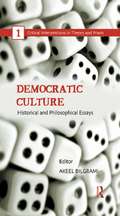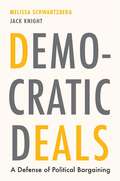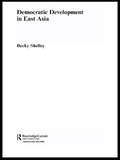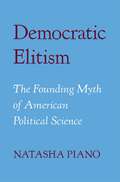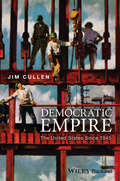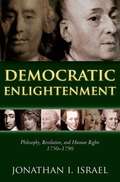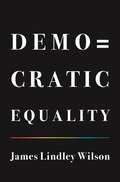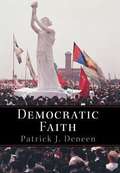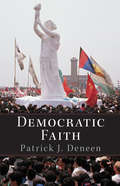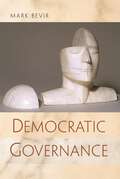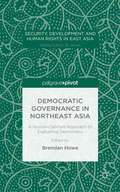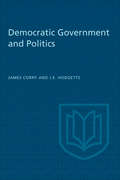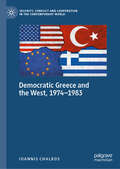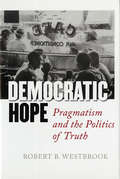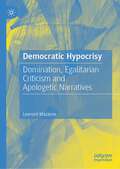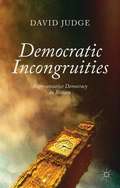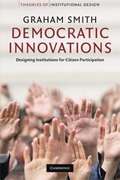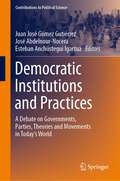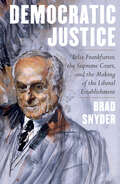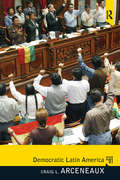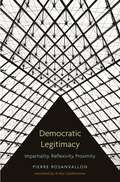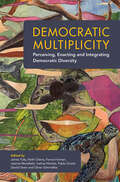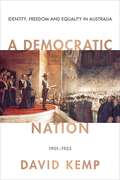- Table View
- List View
Democratic Culture: Historical and Philosophical Essays (Critical Interventions in Theory and Praxis)
by Akeel BilgramiA collection of essays by distinguished scholars, this book delineates a substantial conception of democracy, the great promise as well as the pitfalls of a democratic mentality and culture. These essays go beyond the institutional and formal descriptions of democracy to its underlying cultural context — expressed both historically and analytically, descriptively and normatively.
Democratic Deals: A Defense of Political Bargaining
by Jack Knight Melissa SchwartzbergTwo leading scholars of democracy make the case for political bargaining and define its proper limits.Bargains—grand and prosaic—are a central fact of political life. The distribution of bargaining power affects the design of constitutions, the construction of party coalitions, legislative outcomes, judicial opinions, and much more. But can political bargaining be justified in theory? If it inevitably involves asymmetric power, is it anything more than the exercise of sublimated force, emerging from and reifying inequalities?In Democratic Deals, Melissa Schwartzberg and Jack Knight defend bargaining against those who champion deliberation or compromise, showing that, under the right conditions and constraints, it can secure political equality and protect fundamental interests. The challenge, then, is to ensure that these conditions prevail. Drawing a sustained analogy to the private law of contracts—in particular, its concepts of duress and unconscionability—the authors articulate a set of procedural and substantive constraints on the bargaining process and analyze the circumstances under which unequal bargaining power might be justified in a democratic context. Institutions, Schwartzberg and Knight argue, can facilitate gains from exchange while placing meaningful limits on the exercise of unequal power.Democratic Deals examines frameworks of just bargaining in a range of contexts—constitution-making and legislative politics, among judges and administrative agencies, across branches of government, and between the state and private actors in the course of plea deals. Bargaining is an ineradicable fact of political life. Schwartzberg and Knight show that it can also be essential for democracy.
Democratic Deliberation in Deeply Divided Societies
by Juan E. Ugarriza Didier CaluwaertsThrough case-analysis and cross-sectional assessment of eleven countries this collection explores the most deeply divided societies in the world in order to highlight what deliberative democracy looks like in a deeply divided society and to understand the conditions that deliberative democracies could realistically emerge in difficult circumstances
Democratic Development in East Asia (Politics in Asia)
by Becky ShelleyDemocratic Development in East Asia explores an important but neglected topic in the literature on democratization in East Asia: the international dimension of democratization. It presents a coherent and comprehensive analysis of the impact of external political, economic and cultural factors on China, South Korea and Taiwan's political development since World War II. The author analyzes the circumstances under which the international context affects domestic actors' choice of political institutions and actions and concentrates on a selection of key international structures and actors that make up this complex picture. Shelley also examines the international political economy, aspects of the United Nations system, diffuse cultural factors and processes, democracy movements, and a number of international non-government organizations.
Democratic Elitism: The Founding Myth of American Political Science
by Natasha PianoA searing argument—and work of meticulous scholarship—about how American political scientists misinterpreted the elite theory of democracy and in so doing made our political system vulnerable to oligarchic takeover.Do competitive elections secure democracy, or might they undermine it by breeding popular disillusionment with liberal norms and procedures? The so-called Italian School of Elitism, comprising Vilfredo Pareto, Gaetano Mosca, and Robert Michels, voiced this very concern. They feared that defining democracy exclusively through representative practices creates unrealistic expectations of what elections can achieve, generating mass demoralization and disillusionment with popular government.The Italian School’s concern has gone unheeded, even as their elite theory has been foundational for political science in the United States. Democratic Elitism argues that scholars have misinterpreted the Italians as conservative, antidemocratic figures who championed the equation of democracy with representative practices to restrain popular participation in politics. Natasha Piano contends not only that the Italian School’s thought has been distorted but also that theorists have ignored its main objective: to contain demagogues and plutocrats who prey on the cynicism of the masses. We ought to view these thinkers not as elite theorists of democracy but as democratic theorists of elitism.The Italian School’s original writings do not reject electoral politics; they emphasize the power and promise of democracy beyond the ballot. Elections undoubtedly are an essential component of functioning democracies, but in order to preserve their legitimacy we must understand their true capacities and limitations. It is past time to dispel the delusion that we need only elections to solve political crises, or else mass publics, dissatisfied with the status quo, will fall deeper into the arms of authoritarians who capture and pervert formal democratic institutions to serve their own ends.
Democratic Empire: The United States Since 1945
by Jim CullenA brief survey of U.S. history since the end of World War II, focusing on popular beliefs, fears, and hopes that have shaped American culture and history over the last eight decades. Explores the ways in which the American people's perceptions of power were as significant as the realities of that power, and how popular beliefs shaped the events of post-WWII America Gives particular attention to mass media, the fine arts, and intellectual currents, exploring their role in American society Features "Culture Watch" chapter sidebars, which help students delve into particular classic works of American culture Intermixes political and social history along with cultural history to provide a comprehensive narrative
Democratic Enlightenment: Philosophy, Revolution, and Human Rights 1750-1790
by Jonathan IsraelRunning counter to mainstream thinking, Jonathan Israel presents a radical account of the late Enlightenment highlights forgotten currents and figures. He demonstrates how a group of philosophe-revolutionnaires provided the intellectual powerhouse of the French Revolution, and how their ideas connect with modern Western democracy.
Democratic Equality
by James Lindley WilsonDemocracy establishes relationships of political equality, ones in which citizens equally share authority over what they do together and respect one another as equals. But in today's divided public square, democracy is challenged by political thinkers who disagree about how democratic institutions should be organized, and by antidemocratic politicians who exploit uncertainties about what democracy requires and why it matters. Democratic Equality mounts a bold and persuasive defense of democracy as a way of making collective decisions, showing how equality of authority is essential to relating equally as citizens.James Lindley Wilson explains why the US Senate and Electoral College are urgently in need of reform, why proportional representation is not a universal requirement of democracy, how to identify racial vote dilution and gerrymandering in electoral districting, how to respond to threats to democracy posed by wealth inequality, and how judicial review could be more compatible with the democratic ideal. What emerges is an emphatic call to action to reinvigorate our ailing democracies, and a road map for widespread institutional reform.Democratic Equality highlights the importance of diverse forms of authority in democratic deliberation and electoral and representative processes—and demonstrates how that authority rests equally with each citizen in a democracy.
Democratic Faith
by Patrick J. DeneenThe American political reformer Herbert Croly wrote, "For better or worse, democracy cannot be disentangled from an aspiration toward human perfectibility." Democratic Faith is at once a trenchant analysis and a powerful critique of this underlying assumption that informs democratic theory. Patrick Deneen argues that among democracy's most ardent supporters there is an oft-expressed belief in the need to "transform" human beings in order to reconcile the sometimes disappointing reality of human self-interest with the democratic ideal of selfless commitment. This "transformative impulse" is frequently couched in religious language, such as the need for political "redemption." This is all the more striking given the frequent accompanying condemnation of traditional religious belief that informs the "democratic faith." At the same time, because so often this democratic ideal fails to materialize, democratic faith is often subject to a particularly intense form of disappointment. A mutually reinforcing cycle of faith and disillusionment is frequently exhibited by those who profess a democratic faith- in effect imperiling democratic commitments due to the cynicism of its most fervent erstwhile supporters. Deneen argues that democracy is ill-served by such faith. Instead, he proposes a form of "democratic realism" that recognizes democracy not as a regime with aspirations to perfection, but that justifies democracy as the regime most appropriate for imperfect humans. If democratic faith aspires to transformation, democratic realism insists on the central importance of humility, hope, and charity.
Democratic Faith (New Forum Books #36)
by Patrick DeneenThe American political reformer Herbert Croly wrote, "For better or worse, democracy cannot be disentangled from an aspiration toward human perfectibility." Democratic Faith is at once a trenchant analysis and a powerful critique of this underlying assumption that informs democratic theory. Patrick Deneen argues that among democracy's most ardent supporters there is an oft-expressed belief in the need to "transform" human beings in order to reconcile the sometimes disappointing reality of human self-interest with the democratic ideal of selfless commitment. This "transformative impulse" is frequently couched in religious language, such as the need for political "redemption." This is all the more striking given the frequent accompanying condemnation of traditional religious belief that informs the "democratic faith.? At the same time, because so often this democratic ideal fails to materialize, democratic faith is often subject to a particularly intense form of disappointment. A mutually reinforcing cycle of faith and disillusionment is frequently exhibited by those who profess a democratic faith--in effect imperiling democratic commitments due to the cynicism of its most fervent erstwhile supporters. Deneen argues that democracy is ill-served by such faith. Instead, he proposes a form of "democratic realism" that recognizes democracy not as a regime with aspirations to perfection, but that justifies democracy as the regime most appropriate for imperfect humans. If democratic faith aspires to transformation, democratic realism insists on the central importance of humility, hope, and charity.
Democratic Governance
by Mark BevirDemocratic Governance examines the changing nature of the modern state and reveals the dangers these changes pose to democracy. Mark Bevir shows how new ideas about governance have gradually displaced old-style notions of government in Britain and around the world. Policymakers cling to outdated concepts of representative government while at the same time placing ever more faith in expertise, markets, and networks. Democracy exhibits blurred lines of accountability and declining legitimacy. Bevir explores how new theories of governance undermined traditional government in the twentieth century. Politicians responded by erecting great bureaucracies, increasingly relying on policy expertise and abstract notions of citizenship and, more recently, on networks of quasi-governmental and private organizations to deliver services using market-oriented techniques. Today, the state is an unwieldy edifice of nineteenth-century government buttressed by a sprawling substructure devoted to the very different idea of governance--and democracy has suffered. In Democratic Governance, Bevir takes a comprehensive look at governance and the history and thinking behind it. He provides in-depth case studies of constitutional reform, judicial reform, joined-up government, and police reform. He argues that the best hope for democratic renewal lies in more interpretive styles of expertise, dialogic forms of policymaking, and more diverse avenues for public participation.
Democratic Governance in Northeast Asia: A Human-centred Approach To Evaluating Democracy (Security, Development And Human Rights In East Asia Ser.)
by Brendan HoweComprising case studies of Japan, South Korea, and Taiwan, this edited volume explores the key characteristics of democratic governance in Northeast Asia. Each democracy is assessed on the extent to which it enables the flourishing of social capital; prioritizes the interests of all as characterized by freedom from fear and want; and empowers all to participate in the democratic process and governance. With particular focus on the experience of minorities, this volume contends that the acid test of democratic governance is not how well the government represents the interests of the elites, or even the majority, but rather how it cares for the needs of vulnerable groups in society.
Democratic Government and Politics: Third Revised Edition
by James Corry John HodgettsCompletely revised and enlarged edition (1951) of a book which has become a standard work on comparative government. This edition brings up to date the material on institutions and practices of government in Britain, the United States, and Canada, and analyses more fully the relationship of democratic institutions and practices to the essentials of the democratic creed.
Democratic Greece and the West, 1974-1983 (Security, Conflict and Cooperation in the Contemporary World)
by Ioannis ChalkosThis book examines Greece's evolving relationship with the West from 1974 to 1983, focusing on the country&’s transition from a peripheral European state to a central member of the Western community. Adopting a multilateral approach, the author investigates Greece's interactions with key institutions such as the European Economic Community (EEC) and NATO, as well as bilateral relations with major Western powers, exploring their role in shaping Athens' external orientation and internal stability. The book highlights the challenges Greece faced in balancing its national interests—particularly security concerns regarding Turkey—with its broader integration into Western structures. Covering a decade of critical developments, the book presents 1983 as a pivotal year in Greek history, signifying the establishment of a historical consensus on the country&’s external orientation. Highlighting an often overlooked event in Cold War history, Greece's integration into the West, this book provides useful reading for those researching international relations, Greek history, the Cold War, as well as European diplomatic history more broadly.
Democratic Hope: Pragmatism and the Politics of Truth
by Robert B. Westbrook"The pragmatists' response to the claim that theirs is a deeply American philosophy has been less to challenge the claim than to attempt to embrace it on their own terms. . . . One could speak of a national philosophy as one could not speak of a national chemistry or physics. But national cultures were complicated and often conflicted. Hence the relationship between a philosophy and a national culture could be at once close and fraught with tension."—from Democratic Hope Pragmatism, as Richard Rorty has said, "names the chief glory of our country's intellectual tradition." In Democratic Hope, Robert B. Westbrook examines the varieties of classical pragmatist thought in the work of John Dewey, William James, and Charles Peirce, testing in good pragmatic fashion the truth of propositions by their consequences in experience. Westbrook also attends to the recent revival of pragmatism by Rorty, Cheryl Misak, Richard Posner, Hilary Putnam, Cornel West, and others and to pragmatist strains in contemporary American political thinking. Westbrook's aims are both historical and political: to ensure that the genealogy of pragmatism is an honest one and to argue for a hopeful vision of deliberative democracy underwritten by a pragmatist epistemology and ethics.
Democratic Hypocrisy: Domination, Egalitarian Criticism and Apologetic Narratives
by Leonard MazzoneUnconfessed by definition, hypocrisy is one of the most used and abused polemical categories, even today, to denounce the "masked cynicism" of certain social actors, especially when they hold public office. But has hypocrisy always been just that? Should we really always be wary of it and challenge its every manifestation? What forms of hypocrisy can we distinguish? What kind of relationship exists between hypocrisy and the lack of self-critical attitude of those who are used to challenge the conduct of others? And above all: what relationship exists between this common vice, democratic politics and the institutional reproduction of different forms of oppression and domination? These are just some of the questions that inspire this philosophical journey back into the history of one of the most chameleonic concepts of Western culture. In Mazzone’s conception, democratic hypocrisy includes argumentative strategies used by institutional actors to refuse any kind of responsibility when their decisions, actions or roles are called into question by the protests of citizens in a democratic context. He reveals the relationship that exists between such “apologetic narratives” and the institutional reproduction of different forms of oppression and domination. Ultimately, the book urges civic vigilance against underhand wannabe authoritarians, who – as a group – are evolving to find new ways to trick people into opposing democracy.
Democratic Incongruities
by David JudgeClear disparities exist between notions of representative democracy and political practice in Britain. Alternative models of democracy, however, have their own incongruities in trying to marry representation and democracy. This book analyses the mismatches in democratic theories and between theory and practice in British representative democracy.
Democratic Innovations: Designing Institutions for Citizen Participation
by Graham SmithCan we design institutions that increase and deepen citizen participation in the political decision making process? At a time when there is growing disillusionment with the institutions of advanced industrial democracies, there is also increasing interest in new ways of involving citizens in the political decisions that affect their lives. This book draws together evidence from a variety of democratic innovations from around the world, including participatory budgeting in Brazil, Citizens' Assemblies on Electoral Reform in Canada, direct legislation in California and Switzerland and emerging experiments in e-democracy. The book offers a rare systematic analysis of this diverse range of democratic innovations, drawing lessons for the future development of both democratic theory and practice.
Democratic Institutions and Practices: A Debate on Governments, Parties, Theories and Movements in Today’s World (Contributions to Political Science)
by José Abdelnour-Nocera Juan José Gómez Gutiérrez Esteban Anchústegui IgartuaThis book explores key contemporary issues of democracy in our globalized and highly technologized world. Written from an interdisciplinary perspective, with contributions including the fields of philosophy, political science, media studies, linguistics, and aesthetics, it reflects on the characteristics of the democratic state and democratic social practices.The book features contributions on topics such as the status of political parties, the separation of powers and the rule of law, bureaucracy and meritocracy, equality, forms of democratic participation and governance, comparisons between historical and contemporary democratic practices, individual rights, propaganda, political engagement, and consent. Further, it discusses how global information flows and new technologies affect democratic processes, including topics such as cyber-activism and open-source software as a means of empowerment to ethnocentric and class-centric technological design, globalization and media neutrality, and the mechanization of public administration. Overall, the book demonstrates how historical, philosophical, technical, and institutional issues relate to contemporary democracy. It will appeal to political theorists, social scientists and everybody interested in contemporary democracy.
Democratic Justice: Felix Frankfurter, The Supreme Court, And The Making Of The Liberal Establishment
by Brad SnyderThe definitive biography of Felix Frankfurter, Supreme Court justice and champion of twentieth-century American liberal democracy. The conventional wisdom about Felix Frankfurter—Harvard law professor and Supreme Court justice—is that he struggled to fill the seat once held by Oliver Wendell Holmes. Scholars have portrayed Frankfurter as a judicial failure, a liberal lawyer turned conservative justice, and the Warren Court’s principal villain. And yet none of these characterizations rings true. A pro-government, pro-civil rights liberal who rejected shifting political labels, Frankfurter advocated for judicial restraint—he believed that people should seek change not from the courts but through the democratic political process. Indeed, he knew American presidents from Theodore Roosevelt to Lyndon Johnson, advised Franklin Roosevelt, and inspired his students and law clerks to enter government service. Organized around presidential administrations and major political and world events, this definitive biography chronicles Frankfurter’s impact on American life. As a young government lawyer, he befriended Theodore Roosevelt, Louis Brandeis, and Holmes. As a Harvard law professor, he earned fame as a civil libertarian, Zionist, and New Deal power broker. As a justice, he hired the first African American law clerk and helped the Court achieve unanimity in outlawing racially segregated schools in Brown v. Board of Education. In this sweeping narrative, Brad Snyder offers a full and fascinating portrait of the remarkable life and legacy of a long misunderstood American figure. This is the biography of an Austrian Jewish immigrant who arrived in the United States at age eleven speaking not a word of English, who by age twenty-six befriended former president Theodore Roosevelt, and who by age fifty was one of Franklin Roosevelt’s most trusted advisers. It is the story of a man devoted to democratic ideals, a natural orator and often overbearing justice, whose passion allowed him to amass highly influential friends and helped create the liberal establishment.
Democratic Latin America
by Craig ArceneauxDrawing on new approaches in comparative politics, Democratic Latin America focuses on analyzing political institutions as a way to assess broader trends in the region’s politics, including the rise of democracy. The text looks at the major institutions–executive, legislature, judiciary, military, and more—in 18 democratic countries to not only provide an expansive view of politics in Latin America but to also facilitate cross-national comparison. Democratic Latin America uniquely surveys the "what” of the region’s politics as well as the “why” and “how” to help students critically consider Latin America’s future.
Democratic Legitimacy: Impartiality, Reflexivity, Proximity
by Pierre RosanvallonIt's a commonplace that citizens in Western democracies are disaffected with their political leaders and traditional democratic institutions. But in Democratic Legitimacy, Pierre Rosanvallon, one of today's leading political thinkers, argues that this crisis of confidence is partly a crisis of understanding. He makes the case that the sources of democratic legitimacy have shifted and multiplied over the past thirty years and that we need to comprehend and make better use of these new sources of legitimacy in order to strengthen our political self-belief and commitment to democracy. Drawing on examples from France and the United States, Rosanvallon notes that there has been a major expansion of independent commissions, NGOs, regulatory authorities, and watchdogs in recent decades. At the same time, constitutional courts have become more willing and able to challenge legislatures. These institutional developments, which serve the democratic values of impartiality and reflexivity, have been accompanied by a new attentiveness to what Rosanvallon calls the value of proximity, as governing structures have sought to find new spaces for minorities, the particular, and the local. To improve our democracies, we need to use these new sources of legitimacy more effectively and we need to incorporate them into our accounts of democratic government. An original contribution to the vigorous international debate about democratic authority and legitimacy, this promises to be one of Rosanvallon's most important books.
Democratic Militarism
by Jonathan D. CaverleyWhy are democracies pursuing more military conflicts, but achieving worse results? Democratic Militarism shows that a combination of economic inequality and military technical change enables an average voter to pay very little of the costs of large militaries and armed conflict, in terms of both death and taxes. Jonathan Caverley provides an original statistical analysis of public opinion and international aggression, combined with historical evidence from the late Victorian British Empire, the US Vietnam War effort, and Israel's Second Lebanon War. This book undermines conventional wisdom regarding democracy's exceptional foreign policy characteristics, and challenges elite-centered explanations for poor foreign policy. This accessible and wide ranging book offers a new account of democratic warfare, and will help readers to understand the implications of the revolution in military affairs.
Democratic Multiplicity: Perceiving, Enacting, and Integrating Democratic Diversity
by David Owen James Tully Jeanne Morefield Oliver Schmidtke Fonna Forman Joshua Nichols Pablo Ouziel Keith CherryThis edited volume argues that democracy is broader and more diverse than the dominant state-centered, modern representative democracies, to which other modes of democracy are either presumed subordinate or ignored. The contributors seek to overcome the standard opposition of democracy from below (participatory) and democracy from above (representative). Rather, they argue that through differently situated participatory and representative practices, citizens and governments can develop democratic ways of cooperating without hegemony and subordination, and that these relationships can be transformative. This work proposes a slow but sure, nonviolent, eco-social and sustainable process of democratic generation and growth with the capacity to critique and transform unjust and ecologically destructive social systems. This volume integrates human-centric democracies into a more mutual, interdependent and sustainable system on earth whereby everyone gains.
Democratic Nation: Identity, Freedom and Equality in Australia 1901–1925
by David KempA Democratic Nation: Identity, Freedom and Equality in Australia 1901-1925 tells the story of the political battle after Federation to achieve unprecedented levels of social and economic equality, while preserving both national independence and individual freedom. As the third book in a landmark five-volume Australian Liberalism series, A Democratic Nation shows how Australians, inspired by the exceptional democracy they had achieved, set out to perfect its principles while protecting it from a world they saw as increasingly threatening. The period saw political battles within and between Liberal and Labor parties as attempts to protect identities defined by nation, class and race confronted ideas of individual freedom and equality. As the war of 1914-18 between the European empires gave rise to unimaginable horrors, economic chaos and continuing violence, the Australian Labor Party shattered and the Liberal Party became submerged in a new Nationalist win-the-war alliance. In peacetime it struggled to restore the nation's social and economic health under the weight of pre-war and wartime identity-based policies. Throughout years of divisive political conflict, the Australian people would remain largely faithful to their hope of a land that would give them freedom to chart their own destinies, and would resist the siren calls of those who promised a conflict-free world by the use of centralised power to reconstruct the industrial and social order.
